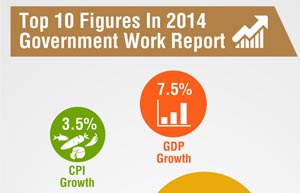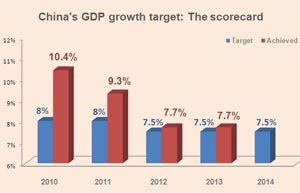Market economy buttressed by rule of law
By Chi Fulin (China Daily) Updated: 2014-03-06 08:22Apart from building a rule-of-law business environment, China needs to let the legal regime play a major role in regulating the market. A series of food and drug safety scandals involving everything from contaminated infant formula to recycled "gutter" oil is testimony of administrative approval being ineffective in market regulation. To shift the focus from administrative regulation to legal regulation, it is imperative to draw a clear line between administrative approval and market regulation, to improve the legal regulatory framework for the consumer market while setting up an integrated and authoritative regulatory body to oversee the market.
 |
 |
A rule-of-law market economy must also entail economic justice. Obsessed with GDP growth, many local governments have taken risks with judicial intervention. It is thus necessary to free the judiciary from the influence of local policymakers.
For this purpose, a central-local dual court system can be set up, so that central-level courts can specialize in hearing cases concerning taxation, finance, bankruptcy, intellectual property and other key economic issues, while general civil and commercial cases can go to local courts.
Also, the resources and human capital of the judicial arm should be properly separated from the administrative divisions and subject to management at the central level.
Chinese people are now expecting the country's reform bill to be further elaborated at the ongoing annual sessions of the country's top legislature and the political consultative body. The aim of building a socialist country under the rule of law undoubtedly serves the request for economic reform, and the country is now set on course to pursue this goal starting with building a rule-of-law market economy.
The author is president of the China Institute for Reform and Development.
|
 |
 |
- NHTSA says finds no 'defect trend' in Tesla Model S sedans
- WTO rare earth ruling is unfair
- Amway says 2014 China sales may grow 8%
- President Xi in Europe: Forging deals, boosting business
- CNOOC releases 2013 sustainability report
- Local production by Chery Jaguar Land Rover this year
- Car lovers test their need for speed in BMW Mission 3
- China stocks close mixed Monday

















